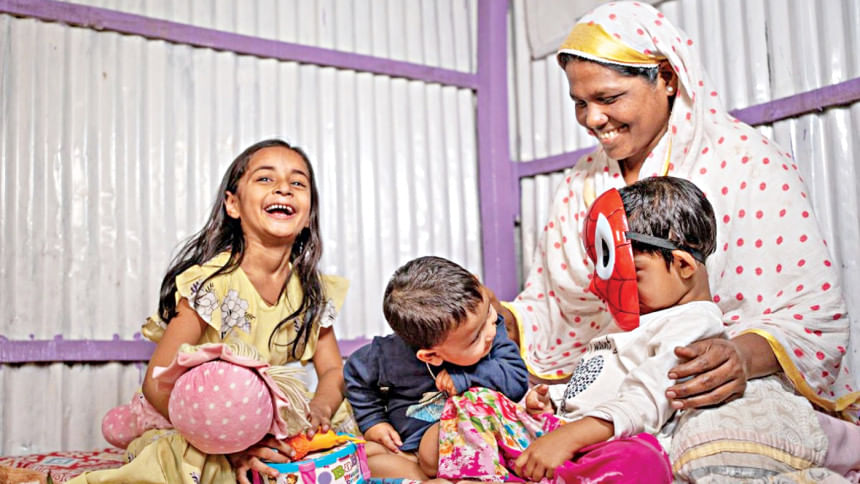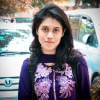A lifeline for low-income working mothers

Before the sun rises over Dhaka's Korail slum, many mothers set out early for a long day of work, carrying the unspoken worry of who will care for their children while they are away.
For many, the answer is uncertain.
Some skip work, others leave their little ones with toddler siblings or neighbours, and in heartbreaking cases, children are tied or locked up alone at home.
To help change this harsh reality, women like Nasrin Sultana Nishi and Salma Akter have transformed their modest homes into safe havens for children whose mothers work long hours in domestic jobs, caregiving, or factories.
For 22-year-old Monira, a domestic worker and mother of four-year-old Sanha, Nishi's initiative has been life-changing.
"I often drop Sanha off by 8:00am. Sometimes work runs out, and I have to find new jobs. But I'm not afraid to leave her at 'Nishi Apa's Daycare' because she's one of us -- we trust her."
Monira smiled as she recalled how Sanha now teaches her about manners -- lessons learned at daycare. "She tells me how to talk to people, how to behave, what's right and what's not. It amazes me."
According to Bangladesh's Labour Force Survey 2022, women's participation in the workforce has continued to rise, yet affordable, safe, and development-focused childcare for low-income mothers remains scarce.
Since 2019, BRAC has supported informal neighbourhood childcare by training caregivers, introducing safety and hygiene standards, and creating a structured home-based daycare model. The network has grown from 19 to 455 caregivers across Dhaka, Tongi, Gazipur, and Savar. In Dhaka alone, 104 caregivers look after nearly 1,820 children aged four months to eight years.
Instead of fixed fees, caregivers charge what mothers can afford, primarily serving garment workers and domestic helpers.
BRAC Institute of Educational Development, BRAC University, has provided technical support to refine the model, which also empowers women economically.
Nishi, 28, a mother of one herself, began her daycare nearly four years ago. "Most of the mothers are domestic workers," she said, watching five toddlers play in her small courtyard. "Since 2023, I've completed 11 BRAC training sessions on hygiene, safety, and supporting children's mental and emotional growth."
Pointing to safety switches and buckets stored out of reach, she explained, "I learned boys and girls should be bathed separately, and water buckets must be kept away from babies. These small details keep children safe."
Though her income is modest, Nishi takes pride in her work. "These children become part of my life. If mothers cannot cook, I do. I want them to feel safe and loved here."
Across the slum, 42-year-old Salma Akter has offered similar care for over two decades. Currently caring for six children, she earns around Tk 2,300 a month.
"Money has never been the main motivation. Mothers work knowing their children are safe, while I gain independence and contribute to my family."
After training with BRAC recently, she said, "I've learned how to comfort upset children and encourage their independence during feeding. These skills really matter."
Ferdousi Khanom, senior lecturer and early childhood development academic lead at BRAC IED, BRAC University, said the model was developed through research and caregiver feedback.
It trains care entrepreneurs in attachment, safety, safeguarding, stimulation, and inclusivity, and engages children in culturally relevant activities that promote physical, socio-emotional, cognitive, and language development.
"After initial training, caregivers receive regular on-site mentorship and monitoring…. A detailed checklist tracks adherence to safety, hygiene, and learning standards. Supervisors visit centres twice weekly to provide real-time feedback," she said.
BRAC has also developed minimum quality standards tailored to home-based childcare, balancing feasibility with essential protection and development needs.
Since its inception, the model has boosted mothers' ability to work and improve livelihoods by offering reliable, culturally grounded childcare.
Morsheda Khatun, a garment worker in Gazipur, now confidently leaves her child at a local daycare. "My child greets, behaves well, and even recites rhymes when guests arrive – things she learned a daycare."
Former preschool teacher Kobita opened her own daycare in Savar after learning about the model. Now caring for 10 children with two assistants, she plans to expand, crediting BRAC's training for her success.
The programme also addresses mental health, with para-counselors visiting centres twice weekly to support children showing signs of withdrawal and help mothers cope with stress. "These mothers carry a lot of stress, and their children often absorb that," said Rokeya Akhter, a para-counselor in Korail.
Challenges, however, remain: frequent migration and job instability among mothers affect children's enrollment, while social stigma around childcare work hinders recognition, Khanom noted.
BRAC is working with community leaders and local governments to promote home-based childcare as a respected service. "If the government were to formally acknowledge the role and impact of home-based childcare and integrate this model into the Childcare Act 2021, it could pave the way for a sustainable, long-term solution," she said.
For mothers like Monira, the benefits are undeniable. "With more training, our children would learn even more. Already, my daughter is ahead of where I was at her age. That means everything."


 For all latest news, follow The Daily Star's Google News channel.
For all latest news, follow The Daily Star's Google News channel. 



Comments